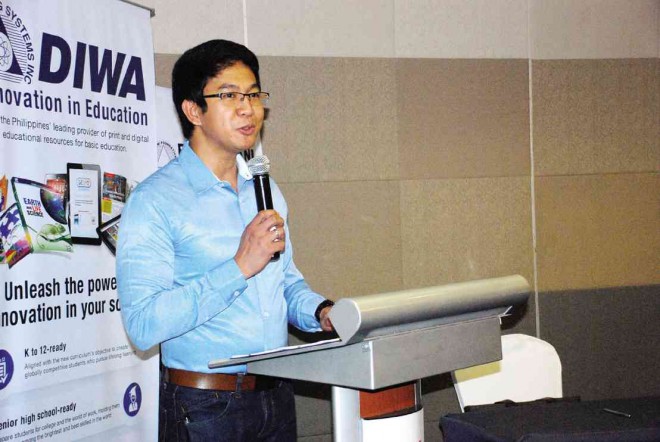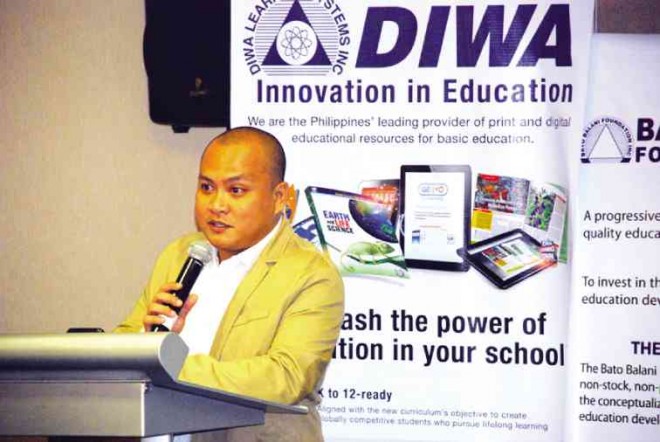New grad program to train e-teachers
Dr. Edizon Angeles Fermin, of Miriam (formerly Maryknoll) College, recalls being told when he was growing up to memorize formulas and study using Bato Balani magazines.
Now Fermin, Miriam’s high school principal, hears students say, “So, have you checked out the latest app?” as he passes by classrooms in the morning.
Fermin says it is “fun” to hear things like this but it can also be a challenge for educators to compete with technology and electronics.
But, apparently, the apps Miriam students are talking about are those the school uses to facilitate instruction and provide supplemental activities.
Miriam College is one of hundreds of schools using the Genyo Learning Management and Content System, an interactive learning portal using digital and electronic equipment for teaching and learning.
Article continues after this advertisementGenyo and other mobile learning applications allow students to “dissect” a frog, for instance, without needing an actual one. Students can use the cameras of their tablets to study a digital frog and explore its endocrine and muscular systems.
Article continues after this advertisementGenyo’s interactive programs, like this, have received positive feedback from teachers, students and parents.
Now Miriam, with Diwa Publishing Group and Bato Balani Foundation Inc. (BBFI), has created a graduate program to show educators the ropes to e-learning. The first of its kind in the country, the graduate program aims to further improve e-learning in the country.
The program Master of Education, major in e-learning, encourages educators to leave the ABC teaching style behind and embrace Information Technology. Its curriculum features the country’s first “learning content and management systems” that Diwa Learning Systems Inc. developed.
Teaching for the future
President of Miriam College Dr. Rosario O. Lapus explains the vision that underpins the program by quoting British science-fiction writer Arthur C. Clarke:
“The object of teaching a child is to enable the child to get along without a teacher. We need to educate our children for their future, not our past.”
Lapus says teachers must provide an environment relevant to the students’ world and interests by “blending modern technology with pedagogy.” As champions of education, they are not going back to the Tyrannosaurus Rex age, but have to adapt to a new one.
Fermin says the Genyo platform is the right choice for the new graduate program. The curriculum is specifically designed to understand the whole e-learning environment and what strategies may be used to create a meaningful community through the platform.
The program introduces educators to new digital technologies like tablet PCs and smartphones. It looks into how equipment may be used critically and creatively to promote teaching and learning suitable for “digital natives” of the 21st century.
“Truth be told, I’m not a tech geek. But when I saw how much fun it was for kids to learn about geographical locations on a real-time basis, connect with people in another time zone, discuss their likes or dislikes or aspirations, it was a powerful learning context. And to me, as an educator, if I do not actually maximize this opportunity, I might be giving up on one important gateway toward these learners adopting a different sense of the world,” Fermin says.
The e-learning program aims to engage and empower teachers and learners in what Fermin describes as a “phenomenal and ennobling experience.” It also aims to expand not only the platforms by which students can learn but also their knowledge.
From sage to guide
He says the new graduate program will transform teachers “from sage on stage to guide on the side” for students.
At present, the Master of Education, major in e-learning program, has 25 scholars, 10 of them from Miriam College. The others are supported by BBFI, Diwa’s social responsibility arm.
Most of the scholars have also taken the Summer Institute on Technology Education, a certificate program on the use of mobile technology for learning and teaching.
Scholar Ryan B. Estillomo, a teacher from Colegio de la Purisima Concepcion in Roxas City, Capiz province, says that if he finishes the program, he will be the first in the Visayas to earn the degree.
“Since students nowadays are into technology, I have to equip myself with these teaching and learning [tools]… I will be happy to share what I learned in the master’s degree program with our students in the Visayas,” he says.
Meeting deadlines
He says his students enjoy beating the buzzer for online deadlines, which encourages them to finish their school work promptly. His students pressure classmates to finish their projects on time.
As one of the educators who designed the curriculum, Fermin acknowledges the problem in areas without the equipment for e-learning.
But he says, “I think that for as long as you have the will, you will find a way, because that’s what happened to us. When we started this entire tablet thing, we were asking ourselves, ‘Is it really the tablet when the smartphones are getting more and more advanced? Do we ask the people to buy the devices?’ … But more than the device or the infrastructure, I think it’s competence to do it [that is more important].”
Fermin believes that in producing “a battalion of e-learning practitioners,” there will come a time when every place in the country will become so wired and connected “we will be able to share practices and even resources.”

